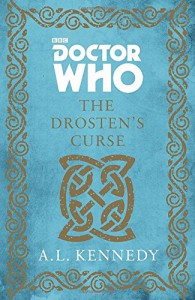
Review: Doctor Who: The Drosten's Curse

(I received an ARC of this title from the publisher via NetGalley, in exchange for an honest review.)
Arbroath, Scotland. Earth. 1978. The Doctor, in his inimitable Fourth incarnation, lands in the middle of a mystery (doesn’t he always?) involving deadly golf bunkers, mind reading, unfortunate spa incidents, alien bounty hunters, octopodes, creepy children, and a creature of mythological dimensions. He is joined by two companions, the clever human Bryony and the inept but likeable Putta.
Despite identifying myself as a Whovian, my experience with the Classic Series has been spotty at best. While I have watched Classic episodes in a meandering sort of way, most of what I know of the Doctors prior to Eight has been gleaned from non-fiction books on the series, like Doctor Who: A History, Who is the Doctor, and The Doctors Are In. Yet I still feel like I have a general understanding of the Fourth Doctor, if only because his legacy has been so iconic and long-lived. While I think anyone with an interest in Doctor Who and little to no experience with the earlier incarnations can appreciate this adventure, I think there are advantages to some knowledge of the Classic run, since The Drosten’s Curse is told in a style more reminiscent of the Classic style of multiple arcs than the shorter, more straightforwardly episodic Modern Series. It also makes references to Classic Series story elements and villains, though sparingly enough not to be overwhelming for readers unfamiliar with the source material.
Like nearly all Doctor Who novels, Curse is narrated in the third person, but unlike most of the other two dozen or so I’ve read so far, it is a very limited third person that adheres closely to the individual thoughts and feelings of the characters. While this would seem to be an odd choice for a plot-heavy adventure story, it is actually a nifty tool for showing the affects of telepathy and mind reading that manifest more and more as the story progresses, without a lot of “hey, you just read my mind!” exposition. Along with the less conventional point of view, there is a Douglas Adams-lite mordantly witty tone that walks a fine line between charming and unbearable. The line is never crossed, but it is occasionally strained.
Despite being rather different from the previous Who novels I’ve experienced, I still find that the criteria for determining success is the same.
Was the Doctor characterized well? Yes- he was all brilliance and bravado and silliness with an edge, like the Fourth Doctor should be.
Were the companions up to snuff? Again, yes. Bryony was particularly good (she was very reminiscent of Sarah Jane) and Putta was just pathetic enough to be funny without being sad. Both worked together well and had a nice joint ending to their adventure.
What about the enemy? This was an instance of the “villain” being hard to pin down, but the figure we are initially given as the villain was pretty brilliant, and the “true” villains were even more terrifying.
Overall? Excellent. It has its strengths and weaknesses, but on balance this is a great entry in the Who novel universe.
 1
1









